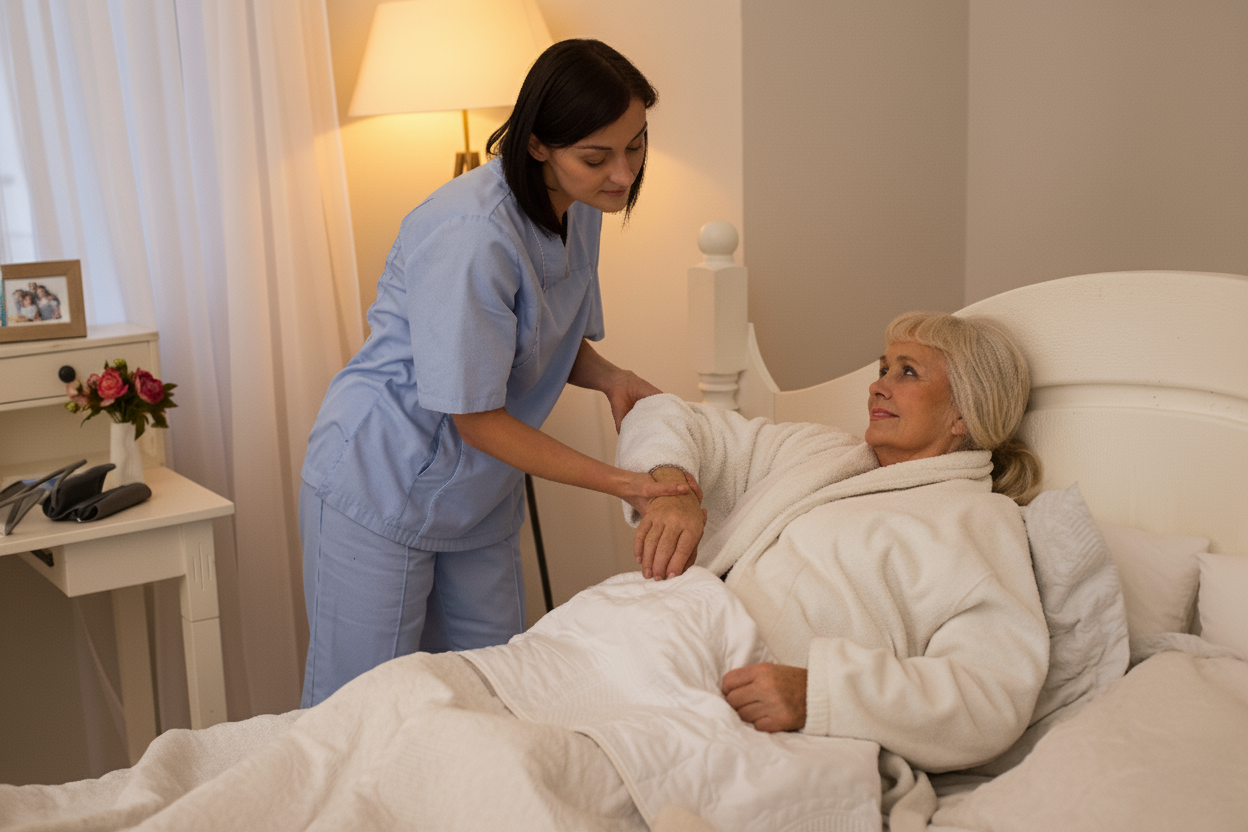
When you have ALS, getting good sleep becomes more challenging as the disease progresses. Your muscles get weaker over time, including the muscles that help you breathe. This can make nighttime especially difficult. But understanding what happens to your breathing and sleep can help you and your care team make things better.
Sleep problems in ALS are not just about feeling tired. Poor sleep can make other ALS symptoms worse and affect your quality of life. The good news is that there are many ways to improve your sleep, from changing how you position yourself in bed to using special equipment that helps you breathe better at night.
Why Sleep Gets Harder with ALS
ALS affects the nerve cells that control your muscles. As these nerve cells stop working, your muscles become weaker. This includes the muscles in your chest and diaphragm that help you breathe. When these breathing muscles get weak, it becomes harder to take deep breaths, especially when you are lying down.
During the day, you might not notice breathing problems as much because you are sitting up or standing. Gravity helps your diaphragm work better in these positions. But at night, when you lie flat, your breathing muscles have to work harder. This is why many people with ALS start having sleep problems before they notice breathing trouble during the day.
Your brain also controls breathing differently when you sleep. During deep sleep and dream sleep, your brain does not control breathing as tightly as when you are awake. If your breathing muscles are already weak from ALS, this can cause problems. You might not breathe deeply enough or often enough while you sleep.
What Is Nocturnal Hypoventilation?
Nocturnal hypoventilation is a term that means not breathing well enough at night. The word “nocturnal” means nighttime, and “hypoventilation” means not getting enough air in and out of your lungs. This happens when your breathing becomes too shallow or too slow while you sleep.
When you do not breathe deeply enough at night, carbon dioxide builds up in your blood. Carbon dioxide is a waste gas that your body needs to get rid of. Too much carbon dioxide can make you feel sick and tired. It can also make it harder for your body to get the oxygen it needs.
People with nocturnal hypoventilation often wake up feeling tired, even after sleeping for many hours. They might have headaches in the morning or feel confused when they first wake up. Some people wake up many times during the night without knowing why. Others might have nightmares or feel short of breath when they lie down.
If you notice these signs, it is important to tell your doctor. Nocturnal hypoventilation can be treated and treating it can help you feel much better during the day.
Understanding Orthopnea
Orthopnea is when you have trouble breathing while lying flat. The word comes from Greek words that mean “straight” and “breath.” If you have orthopnea, you need to prop yourself up with pillows or sleep in a chair to breathe comfortably.
Many people with ALS develop orthopnea as their breathing muscles get weaker. When you lie flat, your diaphragm has to work against gravity to help you breathe. If your diaphragm is weak, this becomes very difficult. You might feel like you cannot catch your breath or like something heavy is sitting on your chest.
Orthopnea often gets worse gradually. You might start by needing one extra pillow, then two, then three or more. Some people eventually need to sleep sitting up in a recliner chair. This is a normal part of how ALS affects breathing, and there are ways to make it more comfortable. The key is to find positions that help you breathe easier while still allowing you to sleep. This might mean using special wedge pillows, adjustable beds, or other equipment. Working with your care team can help you find the best solutions for your situation.
Choosing the Right Pillows and Beds
The right pillows and bed setup can make a huge difference in how well you sleep with ALS. Regular pillows might not give you enough support, and a regular flat bed might make breathing harder.
Wedge pillows are specially shaped pillows that help keep your upper body raised. They are firmer than regular pillows and do not shift around as much during the night. A good wedge pillow can help you breathe easier while still being comfortable enough for sleep.
Some people find that using several regular pillows works well, but others find that regular pillows are too soft or that they slide around too much. The key is finding what works best for you. You might need to try different combinations of pillows to find the right height and support.
Adjustable beds can be very helpful for people with ALS. These beds can raise your head and upper body to any angle you need. Some can also raise your legs, which can help with circulation and comfort. Many insurance plans will cover adjustable beds for people with ALS, especially if your doctor writes a prescription explaining why you need one.
Hospital beds are another option. These beds are designed for people with medical conditions and can be adjusted in many ways. They also have side rails that can help you change positions or get in and out of bed more easily. Like adjustable beds, hospital beds are often covered by insurance for people with ALS.
The mattress you choose is also important. Some people with ALS find that firmer mattresses make it easier to change positions. Others prefer softer mattresses for comfort. Memory foam can be good for preventing pressure sores, but some people find it too warm or hard to move on.
What Overnight Testing Can Show
Doctors have special tests that can check how well you breathe while you sleep. These tests can help them understand if you have nocturnal hypoventilation or other sleep breathing problems. The two main types of testing are oximetry and capnography.
Oximetry measures how much oxygen is in your blood. A small device called a pulse oximeter clips onto your finger and uses light to measure oxygen levels. For overnight testing, you wear this device all night while you sleep at home. The device records your oxygen levels throughout the night.
Normal oxygen levels are usually above 95 percent. If your oxygen levels drop below 90 percent for long periods during sleep, this suggests that you are not breathing well enough at night. The test results show your doctor exactly when and how much your oxygen levels drop.
Capnography measures carbon dioxide levels. This test is a bit more complex than oximetry. You wear a small tube near your nose that measures the carbon dioxide you breathe out. High carbon dioxide levels can show that you are not breathing deeply enough to get rid of this waste gas.
Some overnight tests combine both oximetry and capnography along with other measurements. These tests can show your doctor exactly what happens to your breathing during different stages of sleep. They can also show if you stop breathing completely for short periods, which is called sleep apnea.
The results of these tests help your doctor decide what treatments might help you. If the tests show that you have nocturnal hypoventilation, your doctor might recommend a breathing machine to help you at night. If they show other problems, different treatments might be better.
Sleep Hygiene for Better Rest
Sleep hygiene means having good habits that help you sleep better. When you have ALS, good sleep hygiene becomes even more important because your body is already dealing with the stress of the disease.
Going to bed and waking up at the same time every day helps your body know when it is time to sleep. This is called keeping a regular sleep schedule. Even on weekends, try to stick to your usual bedtime and wake-up time.
Your bedroom should be cool, dark, and quiet. Heavy curtains or blackout shades can help block outside light. A fan or white noise machine can help cover up sounds that might wake you up. The temperature should be comfortable, usually between 65 and 70 degrees.
What you do before bedtime can affect how well you sleep. Try to avoid exciting or stressful activities for at least an hour before bed. This includes watching intense TV shows, using computers or phones, or having serious conversations. Instead, try calm activities like reading, listening to soft music, or doing gentle stretches.
Eating large meals or drinking a lot of fluids right before bed can make sleep harder. Try to finish eating at least two hours before bedtime. If you get hungry before bed, a small snack is okay, but avoid anything heavy or spicy. Caffeine and alcohol can both interfere with sleep. Caffeine can keep you awake, so avoid coffee, tea, soda, and chocolate for several hours before bedtime. Alcohol might make you feel sleepy at first, but it can cause you to wake up more during the night and can make breathing problems worse.
Working with Your Care Team
Managing sleep problems in ALS works best when you have a good care team. This team might include your neurologist, a pulmonologist who specializes in breathing problems, a sleep specialist, and other healthcare providers.
Keep track of your sleep patterns and any problems you notice. Write down when you go to bed, how long it takes you to fall asleep, how many times you wake up, and how you feel in the morning. Also note any breathing difficulties, headaches, or other symptoms. This information helps your doctors understand what is happening and how to help.
Do not wait to report sleep problems. Many people think that poor sleep is just something they have to accept with ALS, but this is not true. There are many treatments that can help, and starting treatment early often works better than waiting until problems become severe. Be honest with your care team about how sleep problems are affecting your daily life. If you are too tired to do things you enjoy, if you are falling asleep during the day, or if family members are worried about your breathing at night, these are all important things for your doctors to know.
Moving Forward with Better Sleep
Having ALS does not mean you have to accept poor sleep. Understanding how ALS affects your breathing and sleep is the first step toward getting better rest. By working with your care team, making changes to your sleep environment, and using the right equipment, you can improve your sleep quality and feel better during the day.
Remember that sleep problems in ALS often change over time. What works for you now might need to be adjusted later as your condition changes. Stay in close contact with your care team and do not hesitate to ask for help when you need it. Good sleep is not a luxury when you have ALS—it is an important part of taking care of your health and maintaining your quality of life.





